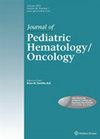Clinical Implications of Solitary Subependymal Giant Cell Astrocytoma in the Absence of Tuberous Sclerosis Complex: Case Series and Comprehensive Literature Review.
IF 0.8
4区 医学
Q4 HEMATOLOGY
Journal of Pediatric Hematology/Oncology
Pub Date : 2025-08-01
Epub Date: 2025-06-16
DOI:10.1097/MPH.0000000000003063
引用次数: 0
Abstract
Subependymal giant cell astrocytoma (SEGA) is a slow-growing glial or glioneuronal tumor that almost exclusively occurs in patients with Tuberous Sclerosis Complex (TSC), a rare autosomal dominant condition that causes growth of benign tumors throughout the body. Herein, we present 4 cases of isolated SEGA in patients with negative germline testing for TSC alterations and present a comprehensive literature review of other cases of sporadic SEGA. This case series emphasizes the importance of considering SEGA on the differential diagnosis for periventricular tumors even in the absence of other sequelae of TSC and illustrates the importance of long-term monitoring for tuberous sclerosis-related complications.
单发室管膜下巨细胞星形细胞瘤在没有结节性硬化症的情况下的临床意义:病例系列和综合文献综述。
室管膜下巨细胞星形细胞瘤(SEGA)是一种生长缓慢的胶质细胞或胶质神经元肿瘤,几乎只发生在结节性硬化症(TSC)患者中,TSC是一种罕见的常染色体显性遗传病,可导致全身良性肿瘤的生长。在此,我们报告了4例分离性SEGA患者的种系检测阴性TSC改变,并对其他散发性SEGA病例进行了全面的文献回顾。本病例系列强调了在没有TSC其他后遗症的情况下,考虑SEGA对脑室周围肿瘤鉴别诊断的重要性,并说明了长期监测结节性硬化症相关并发症的重要性。
本文章由计算机程序翻译,如有差异,请以英文原文为准。
求助全文
约1分钟内获得全文
求助全文
来源期刊
CiteScore
1.90
自引率
8.30%
发文量
415
审稿时长
2.5 months
期刊介绍:
Journal of Pediatric Hematology/Oncology (JPHO) reports on major advances in the diagnosis and treatment of cancer and blood diseases in children. The journal publishes original research, commentaries, historical insights, and clinical and laboratory observations.

 求助内容:
求助内容: 应助结果提醒方式:
应助结果提醒方式:


